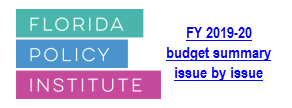Analysis: Gov's $91.4 Bil Budget Some Positive Steps, Little to Reverse Long-Term Inequities
Posted November 19, 2019 09:15 am

ORLANDO, FL – Governor Ron DeSantis’ proposed budget for fiscal year 2020-21 includes a much-needed boost to Florida teacher salaries and recommends full investment in the Sadowski Affordable Housing Trust Fund. Disappointingly, the proposal would do little in the way of addressing income inequality and disparities in Florida’s health care system.
Education
The governor makes an important investment in K-12 education by increasing the minimum salary for full-time classroom teachers to $47,500. This $603 million investment in Florida’s teachers would be unprecedented, and it would help restore cuts made to teacher pay in the decade following the Great Recession, which were deeper in Florida than in any other state.

FY 2019-20 budget summary; get an idea how
the budget works.
The recommended budget also preserves dollars earmarked for affordable housing. This is a crucial step forward, as lawmakers have raided the Sadowski Affordable Housing Trust Fund to the tune of $2.5 billion over the past 16 years.
Environment & Corrections
The governor’s proposal funds Florida Forever, the state’s primary land conservation program, at $100 million. While this is an important commitment to conservation, it’s far below the level needed to make up for years of dismal environmental protection funding at the hands of state lawmakers.
The governor recommends increasing the current year’s Department of Corrections budget by roughly 4 percent. While the proposal increases funding for basic education skills programs, facility repairs and staff salaries, areas such as substance abuse prevention and treatment and work-release received cuts, which would further deteriorate key reentry programs given the current fiscal year deficit.
Health Care
Florida’s high rate of uninsured residents and poor performance on a variety of health and wellness indices should serve as an impetus for increasing access to health care. Unfortunately, the governor's proposed budget continues the state's policy choice of refusing to expand Medicaid, which could give more than 800,000 low-income, uninsured Floridians access to care.
The proposal fails to restore retroactive Medicaid benefits made during the last legislative session and targets adults with disabilities and elderly residents who face major medical crises and crushing medical debt.
The governor continues investments to combat the opioid crisis. However, nearly half of those dollars are time-limited federal grant funds. When these dollars are exhausted, it will create a ‘treatment cliff’ unless state funds are appropriated to continue the increased service capacity.
Temporary Assistance for Needy Families
The budget recommends a decrease in Temporary Assistance for Needy Families (TANF) funding whose benefit levels have remained stagnant for the past 27 years.
Current benefits are so low that the most a three-person family can receive for one year, $3,636, is less than the median monthly household income in Florida. Thousands of grandparents choose to take care of their grandchildren instead of placing them in foster care after the loss of a parent to the opioid epidemic. Neglecting TANF has a detrimental impact on these families.
Epilogue
The budget is not simply a document detailing the dollars and cents of appropriations: it’s a statement of lawmakers’ priorities.
Shared prosperity in the Sunshine State requires investments in education and health care that unleash the productivity of residents. Lawmakers also must launch infrastructure projects that create jobs and generate equitable growth; enact policies to help boost household incomes; and clean up and modernize the tax code. The governor’s budget takes some steps to make investments in Florida’s families, communities and natural resources, but not nearly enough to ensure broadly shared economic opportunity.
---
Sadaf Knight has over 10 years of experience in public policy research, advocacy and nonprofit management. Ms. Knight holds certificates in non-profit management and community development finance. She received a Bachelor of Science in conservation & resource studies from the University of California, Berkeley and a Master of Urban Planning from Columbia University.
Florida Policy Institute is an independent, nonpartisan and nonprofit organization dedicated to advancing state policies and budgets that improve the economic mobility and quality of life for all Floridians.

 By
Sadaf Knight | Florida Policy Institute
By
Sadaf Knight | Florida Policy Institute